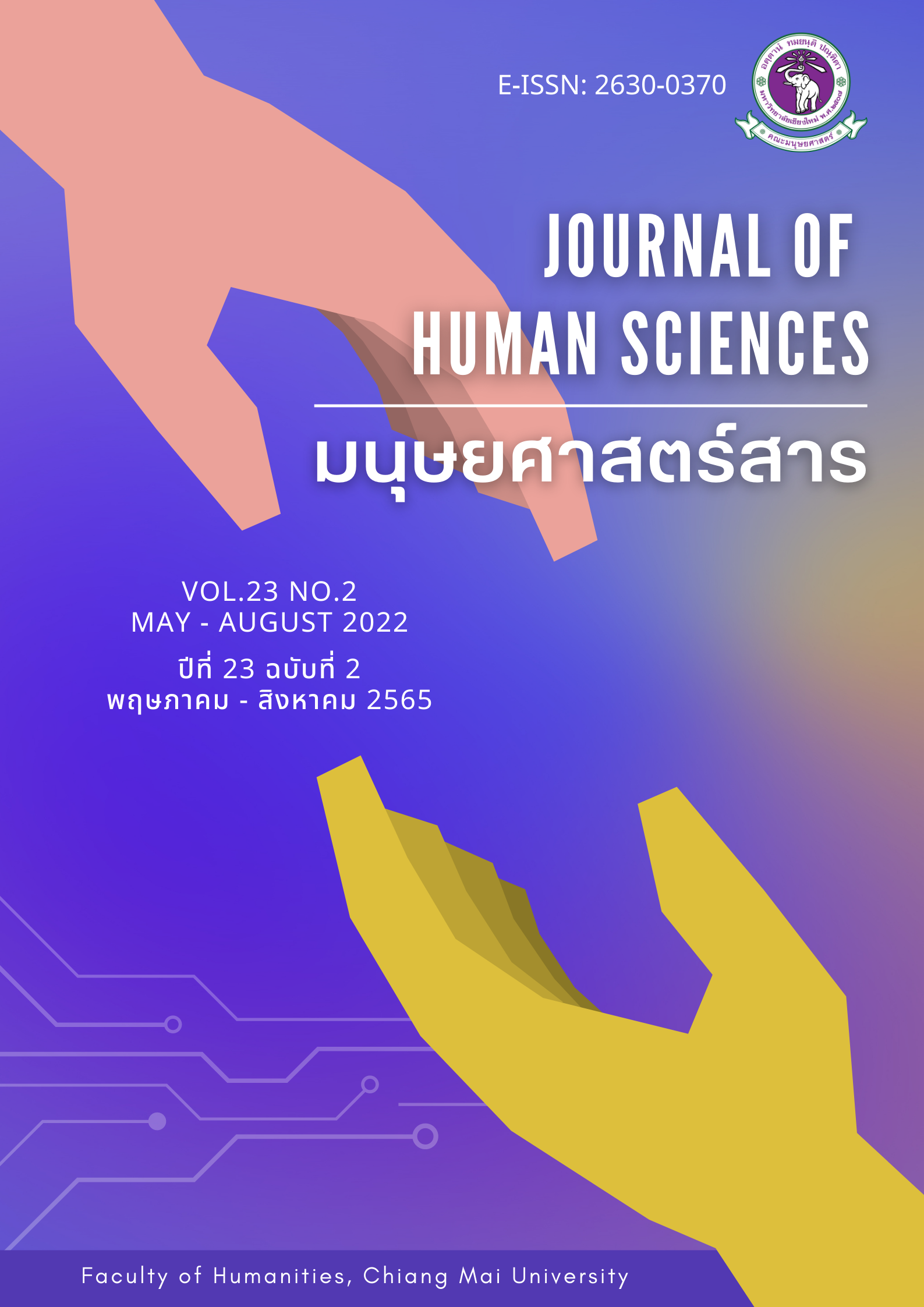การบริโภคความเป็นชนบทและการนำเข้าไลฟ์สไตล์ปลอดการเมืองในบทความแนะนำการท่องเที่ยวจังหวัดเชียงใหม่
Main Article Content
บทคัดย่อ
งานวิจัยนี้ตั้งคำถามต่อการสื่อความหมายของบทความแนะนำสถานที่ท่องเที่ยวในจังหวัดเชียงใหม่ ผู้ผลิตตัวบทคาดหวังให้พื้นที่ชนบท ป่าเขา และกลุ่มชาติพันธุ์ล้อไปได้ดีกับการเนรมิตกิจกรรมวันหยุด ภายหลังขั้นตอนตรวจสอบบทความแนะนำการท่องเที่ยวจังหวัดเชียงใหม่จำนวน 80 บทความ หลักฐานทางภาษาคลี่คลายให้เห็นความหมายที่ผู้ผลิตตัวบทกำกับทิศทางให้สื่อความออกมา 3 แบบ รูปแบบแรกคือความแปลกตาตื่นใจต่อวิถีชีวิตของชาวชนบทและชาวเขา รูปแบบที่สองคือการจำลองฝันร้ายของชีวิตในเมืองที่วุ่นวาย และรูปแบบที่สามคือวิถีชีวิต “สโลว์ไลฟ์” ที่เข้ากันได้ดีกับวัฒนธรรมนำเข้าอย่าง “ฮิปสเตอร์” และศิลปะแบบ “มินิมอล” การสื่อความหมายทั้งสามรูปแบบยังถูกใช้เป็นสัญญะบ่งบอกถึงรสนิยมที่อนุญาตให้นักท่องเที่ยวตักตวงและนำไปยืนยันความโดดเด่นของอัตบุคคล ผลการวิจัยได้แสดงหลักฐานที่ต่างไปจากภาพของความเป็นถิ่นไทยงามและภาพของการท่องเที่ยวเชิงนิเวศที่ไร้เดียงสาเพราะมูลค่าเชิงสัญญะแบบเดิมมีแนวโน้มถูกบริโภคจนใกล้จะหมดลง ขณะเดียวกันมูลค่าชุดใหม่ก็ได้รับการผลิตขึ้นเพื่อให้สอดรับกับความต้องการของกลุ่มชนชั้นกลางร่วมสมัย
Article Details

อนุญาตภายใต้เงื่อนไข Creative Commons Attribution-NonCommercial-NoDerivatives 4.0 International License.
เอกสารอ้างอิง
Adriana, T. (2014). Tourism discourse: a linguistic analysis of Tourism website
(Thesis, University of Pitesti).
Barthes, R. (1972). Mythologies. (Annette Lavers, translator). New York: Hill and Wang.
(Manuscript was published in 1972).
Bipithalal, B. (2017). The politics of tourism representations: Discourse analysis of British travel
brochures about incredible India. Journal of Advanced Research in Social Sciences
and Humanities, 4(2), 238-244.
Baudrillard, J. (1998). The Consumer Society Myths and Structures. Thousand Oaks: Sage.
Caffi, C. (2007). Concise encyclopedia of pragmatics [Pragmatic Presupposition] (Jacob L. Mey,
translator). Oxford: Elsevier Ltd. (manuscript was published in 1998).
Charoenpatrawut, L. (2559) Concept of “Hipster” in contemporary Thai Society. PANIDHANA
Journal, 12(2). 231-248.
Chotiudompant, S. (2555). watthanatham kanboriphok nai banthoengkhadi Thai ruam samai
[Consumer Culture in Contemporary Thai Fiction] (research report). Bangkok:
Chulalongkorn University.
Feangfu, J. (2559). khwampenchai lae hippi plot kanmueang nai phanmaba khong chat kop chitti
[Crisis of Masculinity and Non-Political Hippie in Chart Kobjitti’s Novel Phanmaba (Mad
Dogs)]. In P. Limpanusorn (Eds.), thokthiang rueang khunkha [Debating Values] (p. 149-
. Bangkok: The Thailand Research Fund (TRF).
Grice, H. P. (1975). Logic and Conversation. In P. Cole, & J. L. Morgan. (Eds.), Syntax and
Semantics Speech Acts (p. 41-58). New York: Academic Press.
Halliday, M. A. K. (2014). An Introduction to Functional Grammar (fourth edition). London:
Routledge.
Ico, M., & Piia, V. (2015). The 21st-century hipster: On micro-populations in times of superdiversity.
The Netherlands SAGE, 19(6), 637-653.
Inprayoon, S. (2560). naeo khwamkhit lae krabuan baep nai sinlapa minimon at thi dai rap
itthiphon chak pratya sen [Concept and style of minimal art influenced by Zen philosophy]
(Master’s thesis, Silpakorn University).
Jalilifar, A., & Moradi, Y. (2019) Tourism Discourse Revisited: An Analysis of Evaluative Strategies
in Tourist Brochures from a Systemic Functional Linguistics Perspective. Journal of
English Studies, 17(1), 211-232.
Lakoff, G., & Johnson, M. (1980). Metaphors we live by. Chicago: University of Chicago Press.
Lotta, P. (2012). The Language of Tourism: How the Tourism Industry Promotes Magic
(Thesis, Halmstad University).
Manopiniwes, W., Chernbumroong, S., & Thinnukool, O. (2019). Smart Ecotourism Planning in
Chiang Mai using Traveling Salesman Problem. In ACM International Conference
Proceeding Series (p. 40-45). Taiwan: Taichung.
Michael, P., & Emily, K. (2006). The Modalities of Nostalgia. Communication, Media, Social and
Policy Studies SAGE, 54(6), 919-941.
Palapreewan, P. (2562). From Consumption as Activity to Consumer Culture as Theory. Journal
of Journalism, 14(1), 106-141.
Pattarakulvanit, Ch. (2560). phap sanoe khwampenmueang lae chonnabot nai wannakam Thai
tangtae pi 2475-2501 [The Representation of the Urban and the Rural in Thai Literature
between 1932-1958] (research report). Bangkok: Faculty of Liberal Art Thammasat
University.
Prachakul, N. (2552). yok akson yon khwamkhit 1 [the retortion 1]. Bangkok: read.
Somsri, D. (2549) . kansang phaplak khwamngam khong Chiang Mai PhoSo 2464-2500
[The construction of Chiang Mai's beautiful image, 1921-1957]. (Master’s thesis,
Chulalongkorn University).
Sookprecha, T. (2558) Hipster cha longlua arai wai hai kap sangkhom Thai nai mummong
khong tomon sukpricha [What will “Hipster” be left in Thai society? In Tomorn
Sookprecha’s view]. Retrieved from
https://mgronline.com/marsmag/detail/9580000017208
Susan, B. (2006). Minimalism, subjectivity, and aesthetics: Rethinking the anti-aesthetic tradition in
late-modern art. Journal of Visual Art Practice, 5(3). 127-142.
Tarat, S. (2558). sociology of the senses: understanding people and society through the senses.
Journal of Sociology and Anthropology, 34(2). 103-122.
Yui Ling, J. (2018). Analyzing tourism discourse: A case study of a Hong Kong travel
brochure. (LCOM Papers). The University of Hong Kong.
Yule, G. (1996). Pragmatics. London: Oxford University Press.
Zeestraten, J. (2008). Strolling to the beat of another drum: living the “Slow Life”.
(Master’s thesis, Lincoln University).


